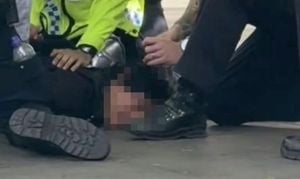A social media post by Dr. Aimi Kuroda, a surgeon at Tokyo Beauty Clinic, has triggered significant backlash after she shared images from her dissection training session held in Guam. The post included photographs showcasing cadavers, where one particularly controversial photo featured her posing with the corpses, raising questions about ethics and professionalism within the medical community.
On December 23, Kuroda took to her blog to update followers about her experience during the training, stating, "I go to dissect fresh cadavers! There are many heads!" Unfortunately for Kuroda, her candid documentation of the event did not go unnoticed and stirred outrage online, prompting her to delete the post shortly after. Critics were quick to condemn the lack of sensitivity, arguing the post hurt the dignity of the deceased.
Following the uproar, Dr. Aso Tai, the director of Tokyo Beauty Clinic, issued apologies through his own Twitter account (now X), stating, "I sincerely apologize to everyone. I am one of the organizers of the seminar. This post is unacceptable." He emphasized the significance of dissection for surgical training, highlighting it as fundamentally important for the advancement of medical professionals. “Dissection is very important for surgeons. It’s different from school dissections as this allows direct benefits to patients,” Aso added.
Both doctors expressed regret over the incident, with Kuroda conveying her embarrassment for the insensitivity displayed. "I sincerely apologize for making everyone feel uncomfortable with my post about the dissection training. I thought I had blurred all corpses, but some parts were not completed. I sincerely apologize for lacking ethical awareness as a doctor," she stated. Her initial intention had been to share her learning experiences, which she acknowledged failed to align with professional ethical standards.
Aso not only apologized but also lamented the situation's impact on the surgical community. He pointed out, "This photo is from dissection practice happening in America; rules differ from Japan. I hope this incident doesn’t extinguish opportunities for clinical doctors to practice dissection." He stressed the need for clarity when it came to donor body protocols and social media sharing, indicating these rules were perhaps not sufficiently communicated to all doctors involved.
The uproar raises pertinent concerns about the ethical line medical professionals must navigate when sharing their experiences online. Aso acknowledged the historical view of dissections as fundamentally educational, noting how critically important they are for developing the skills needed to perform surgeries effectively. He explained, "This is not just about learning anatomy or techniques; it's about enhancing patient care and improving satisfaction among patients who seek surgical procedures.
Despite the challenges presented by this incident, Aso emphasized the importance of transparent discussions surrounding the need for medical practitioners to engage with cadaver dissections as part of their training. "Many doctors may not have this chance. It’s rare to get to work with fresh cadavers, and sharing this experience openly is meant to educate other practitioners as well," he remarked.
Reflecting on the incident, the importance of balancing professional insight with social sensitivity is evident. Aso's statement on not wanting to extinguish the avenues for clinical practice is indicative of the challenges faced by surgeons who seek to navigate ethical waters with respect to modern technology and social platforms.
Going forward, both doctors have committed to learning from this experience. Kuroda expressed gratitude toward the families of those who contributed their bodies for medical research, acknowledging the generosity of donors' families and recognizing the importance of handling such topics with respect and integrity. She stated, "I thank the families of the donated individuals, and I sincerely apologize again for failing to honor their gift correctly through my post."
This incident will likely prompt discussions on ethical education for medical professionals concerning their public engagement strategies, especially as the social media generation continues to shape how information and experiences are shared online.



